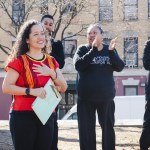
Alexa Avilés: “I Am Deeply Committed to the Working Class”
June 9, 2025
Stop Making Excuses for Americans
June 9, 2025This morning, Israeli authorities captured the aid boat Madleen, halting its mission to Gaza. Just hours before it was intercepted we spoke to Rima Hassan, a French member of the European Parliament who was aboard the vessel.
Early this morning, activists aboard the Madleen announced that their aid boat had been intercepted by Israeli forces and the passengers “kidnapped.” While the British-flagged vessel, operated by the Freedom Flotilla Coalition (FCC), seeks to draw attention to Gazans’ suffering, Israeli authorities have repeatedly sought to delegitimize the activists’ intentions and referred to the boat as a “selfie yacht” carrying “celebrities.”
They now claim that the passengers will be sent back to their home countries, but not before, as hard-line defense minister Israel Katz announced, forcing them to watch footage of the October 7 attacks. For now, attempts to contact the passengers have proven futile.
The Madleen set sail from Italy on June 1 with a clear mission: to break Israel’s blockade and deliver aid to starving civilians in Gaza. On board were twelve activists from across Europe who chose direct action in order to draw more attention to the unfolding humanitarian catastrophe in Palestine, which their governments have failed to address in any meaningful way. One of those passengers is French Palestinian member of European Parliament Rima Hassan, elected in June 2024 as a representative of the left-wing movement La France Insoumise.
Just hours before the Israelis intercepted the Madleen and arrested Hassan, she spoke with journalist Hanno Hauenstein about her motivations for joining the mission, the political backlash in France, and how she deals with the personal risks her Palestine advocacy entails.
- Hanno Hauenstein
-
You’ve been outspoken about Palestine. What motivated you to board this ship?
- Rima Hassan
-
It’s been a year since I was elected to the European Parliament, and I’ve been very engaged on the Palestinian question. But we see that things aren’t moving fast enough. It’s been more than fourteen months since United Nations actors denounced the genocide in Gaza, and we still haven’t seen sanctions or similar measures to stop it. For me, joining this action is about coherence with what I stand for. Also, this action is very powerful. It mobilizes lots of citizens and carries very strong symbolism.
- Hanno Hauenstein
-
A previous aid boat was bombed in May. Others have been killed trying to break the Gaza blockade. How do you deal with this risk to your life?
- Rima Hassan
-
We are all very aware of the risks. Our main concern is precisely that kind of attack we saw on May 2 in Malta. The last ship was larger, and thankfully no one was killed or injured. Our boat is much smaller. A single drone strike could make the boat sink. But we’re prepared. We had several days of training before departure, and we continue to train daily on board. There were several nights when drones were nearby, so we enacted a full-on emergency protocol: putting on life jackets, preparing to jump into the sea.
- Hanno Hauenstein
-
Was it a conscious decision to make this mission so public?
- Rima Hassan
-
The last crew chose discretion, hoping it would help them. But they were attacked anyway. So, we did the opposite: we informed the media, we tried to mobilize public opinion, and maintained visibility to pressure Israel not to attack us.
- Hanno Hauenstein
-
Your ship rescued migrants at sea. What exactly happened?
- Rima Hassan
-
It was a very intense moment. We received a distress call relayed by Frontex, telling us our ship was the closest one to a migrant boat in need. So, we changed course and sailed for two hours toward Libya. Under maritime law, it’s an obligation to rescue people at sea in distress.
When we arrived, we found the migrants on a boat whose engine hadn’t worked for two days. When the coast guards arrived to take the migrants back, four people jumped into the sea. We couldn’t let them drown. They stayed a few hours with us on board. They were fed and examined by a doctor from our team. Eventually, Frontex picked them up and brought them to Greece.
- Hanno Hauenstein
-
Critics say your mission is purely symbolic and won’t deliver any real aid into Gaza. How do you respond to this?
- Rima Hassan
-
We’re aware, as are our critics, that our contribution is symbolic in relation to the immense humanitarian needs. The UN said that around 500 aid trucks per day are necessary for Gaza. We obviously don’t have 500 trucks on board. We have a small load.
- Hanno Hauenstein
-
What are the things you are carrying on the boat?
- Rima Hassan
-
Over 250 kilograms of rice, 100 kilos of flour, 600 units of infant milk, hygiene products for women, medicine, crutches. We do what we can. The mission is deeply political. The goal is to make Gaza accessible for aid. Especially now, as famine is being orchestrated by the Israeli regime, we see it as our responsibility to act. It’s not a journey for fun or adventure. We do this to fill a political vacuum left by the inaction of states. We’re denouncing the complicity of those states.
- Hanno Hauenstein
-
What’s the atmosphere like on board day to day?
- Rima Hassan
-
We want to humanize this mission. We try to stay in good spirits — we cook together, clean together, maintain the ship. It helps us stay focused. We want people following our journey to see who we are and how we live on this ship. We’re also constantly monitoring the news, especially from Israeli and international authorities. Ten UN special rapporteurs recently called on states to assist us in reaching Gaza, citing international law. We’re not the ones violating the law.
- Hanno Hauenstein
-
Israel has accused the mission of supporting terrorism. How do you respond to that?
- Rima Hassan
-
Israel isn’t a reliable interlocutor. For more than a year and a half — and before — Israeli representatives have labeled anyone who criticizes its policies as a terrorist or an antisemite. They accused the UN of antisemitism. They accused the Pope of antisemitism. Even Emmanuel Macron. It’s a war of propaganda.
The accusations against us are part of a broader disinformation campaign. Our response is to speak the language of international law. International law says the blockade is illegal, that ethnic cleansing and genocide are taking place, and that we have a right to deliver humanitarian aid.
- Hanno Hauenstein
-
How do you assess the role of European countries like France and Germany?
- Rima Hassan
-
European states are complicit — or at best passive. This isn’t something new. We can trace it back to the Sykes-Picot Agreement and the colonial partitioning of the region. Under the British Mandate, some of my own family members were imprisoned and killed. Macron may speak of recognizing Palestine, but France continues military cooperation with Israel. [Benjamin] Netanyahu was even allowed to fly over French airspace, despite the active International Criminal Court arrest warrant.
- Hanno Hauenstein
-
Do you see a double standard in how international law is applied?
- Rima Hassan
-
Of course. There shouldn’t be any immunity for the crimes Netanyahu is wanted for — just like there isn’t any immunity for [Vladimir] Putin. I want to stress: this complicity isn’t one that is enacted in the name of the people. Polls show that three out of four French people support sanctions against Israel. In Germany, a recent poll has shown that 80 percent of German citizens oppose the Gaza offensive. There’s a clear disconnect between governments’ actions and public opinion.
- Hanno Hauenstein
-
Have you personally faced political pressure or threats for joining this mission?
- Rima Hassan
-
We did consult the French Foreign Ministry, and they said they don’t advise us to go — because of the risks. Of course, in some media outlets, there has been condescension. They portray us as naive or hateful activists. Fortunately, others have treated this as a serious political act. What we are doing is putting pressure on decision-makers to intervene. Because Israel has warned that they’ll arrest us once we approach the territorial waters of Palestine, which are illegally controlled by Israel.
- Hanno Hauenstein
-
What moment has stayed with you the most so far?
- Rima Hassan
-
The hardest and most emotional moment for me personally was the rescue of the migrants at sea. It was a very difficult thing to see. We did not expect to see them jump into the sea. For a few minutes, we were a little panicked since they were far away. We were scared that they might drown — and die. And what would we have done with the bodies? We really went through all the scenarios. I think this was the moment when everyone broke down a little. I myself cried because it was such a hard moment.
The other moment that was very difficult was when we were woken up in the middle of the night by the alarm for drones. We panicked because we wondered if it was a drone attack or if it was just surveillance. It lasted just a few minutes, but it happened in the middle of the night, so it was a complicated atmosphere, we were just waking up, and it was stressful. When the alarm rings at night, it’s difficult to manage. These were the two moments that were the most emotionally intense.
This interview first appeared on Hanno Hauenstein’s Substack, The Third Draft.
Great Job Rima Hassan & the Team @ Jacobin Source link for sharing this story.







